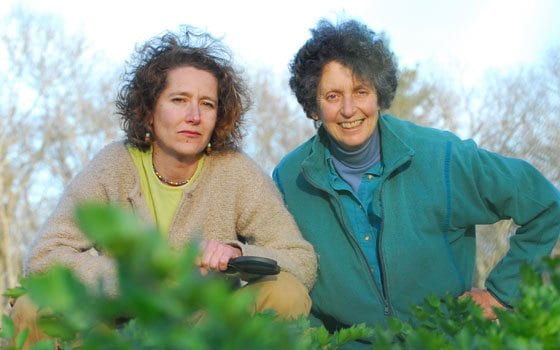
For many in Roxbury, Haley House Bakery Café is a culinary refuge — a source for fresh, nutritious, tasty meals in an otherwise unhealthy food landscape. Offering mouth-watering dishes like barbeque chicken wraps, tuna melt paninis, chocolate chip cookies, curry chicken garden salads and collard greens, Haley House serves some of the best food in the area.
Behind much of the café’s success is Didi Emmons. In 2005, she opened Haley House’s Dudley Square location, becoming its first chef. She now heads the restaurant’s Take Back the Kitchen program, which teaches local kids and adults how to cook. The nonprofit cooking course, which she also co-founded, educates more than 250 residents each year.
But with her newest book, “Wild Flavors: One Chef’s Transformative Year Cooking From Eva’s Farm,” Emmons turns the tables — in it, the Roxbury teacher explains who inspires her to how to cook.
For the past 10 years, Emmons has been trekking to Eva Sommaripa’s farm in Dartmouth, Mass., where more than 200 kinds of herbs and greens grow on a nearly three-acre plot. Visiting Sommaripa, Emmons has been learning about growing, cooking and sustainable living — lessons that she has brought back to her work in Roxbury.
“To me, Eva’s the total role model for how I’d like to live my life,” Emmons said in an interview with the Banner. “She eats so healthy, she lives in a gorgeous environment, she has people all around her, and she’s eating so well.”
“Wild Flavors” is billed as a cookbook — it boasts 150 delicious seasonal recipes for dishes like potato and smoked bluefish stew with summer savory, lovage fish chowder and rose raspberry ice cream — but it’s much more than that. Emmons’ book chronicles a year at Sommaripa’s farm, offering a beautiful collection of recipes, stories, photographs, profiles of different herbs and tips on environmentally friendly practices that together form an homage to her teacher and friend.
Sommaripa’s quirky but principled lifestyle can be instructive for everyone, Emmons said. For instance, Sommaripa is averse to waste — she saves, uses, composts or recycles what most people would just toss out.
Sommaripa saves every twisty tie that crosses her path, and even eats apple cores to avoid throwing food away. “We’re such a consumer culture,” Emmons said. “We think we need so many more things that we really do need … And we can’t keep wasting at the rate that we’re wasting now.”
In keeping with this spirit, “Wild Flavors” instructs readers how to use every part of the plant, how to store them, and in some cases, how to use them even after they’ve gone bad.
But the use of freshly picked herbs and produce is perhaps Sommaripa’s greatest influence on Emmons’ cooking. Sommaripa’s farm boasts unusual herbs that Emmons incorporates into her recipes — everything from African basil to sorrel and summer savory.
With a variety of herbs, Emmons said, meals not only taste better, but are healthier, too, because they need less butter or oil for flavoring. To ease the reader into these lesser-known species, Emmons profiles the plants, explaining their nutritional value and how to grow, cook and store the plants, before introducing them as ingredients in her recipes.
“Working with fresh herbs — and by this I mean not supermarket herbs, but the kind you grow or get at a farmer’s market — can be added to food instead of fat or salt,” Emmons said. “It is a great way to enliven food, add pleasure, and eventually, lose a lot of weight. I just ate a quinoa, raisin, walnut, apple and cilantro salad and it needed no dressing whatsoever because the cilantro was so fresh and so fabulous.”
“The main message [of “Wild Flavors”] is to try to get people to think about growing [food],” she continued. “If you like to cook and if you like food, then this might pique your interest.”
And this is a lesson Emmons has taken back to her youth cooking classes in Roxbury. “If I sever a plant and bring it right to the cooking class, the kids are generally very positive,” she explained. “My experience has been that if I go next door to the supermarket and buy the produce, half the time I can win the kids over with the vegetables, but it goes up to 90 percent when they’re eating directly from the farm.”






